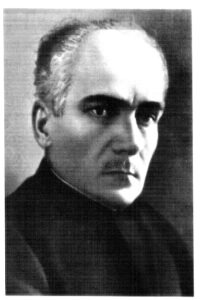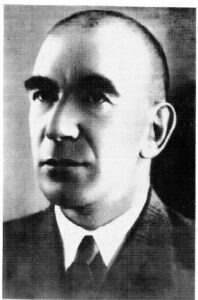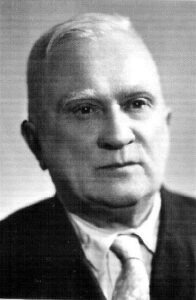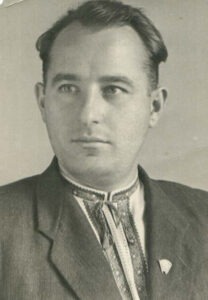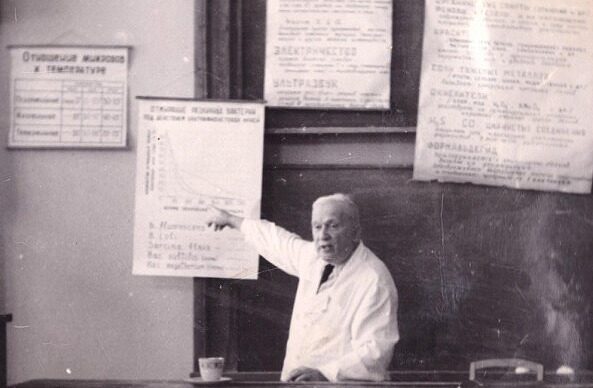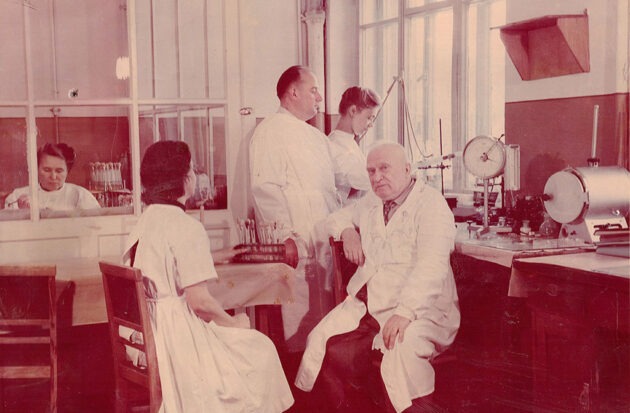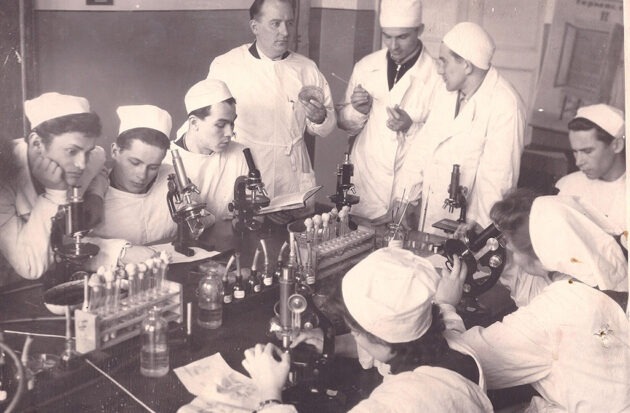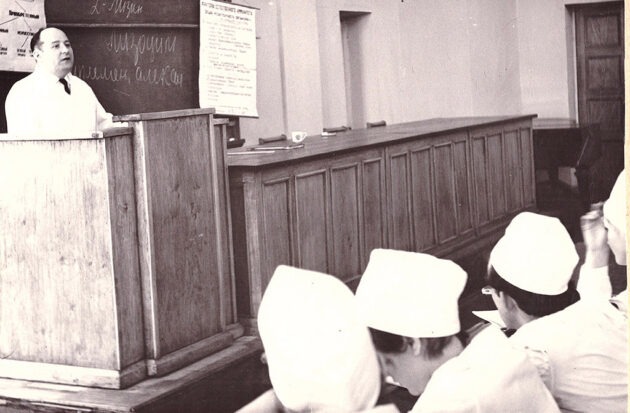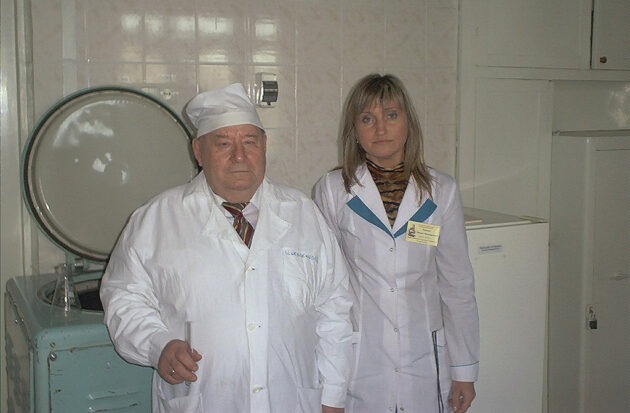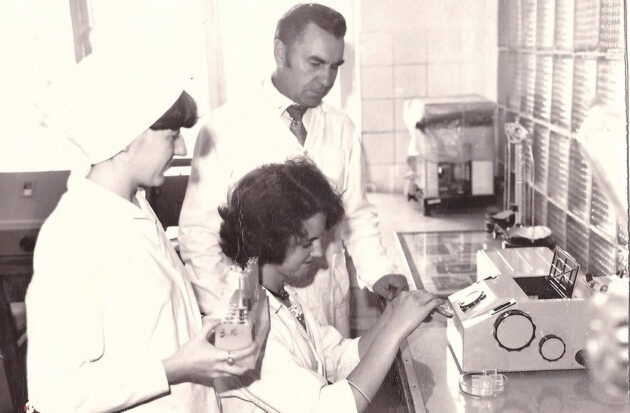The Department of Microbiology was founded in 1922 by Damian Petrovich Grynyov, who was the first head of the department until 1934. Prior to that, the course of bacteriology was taught at the Department of General Pathology and the course of sanitary microbiology was at the Department of General Hygiene.
- D.P.Grynyov
- M.M. Tsekhnovitser
- V.S. Derkach
- A.Ya. Tsyganenko
The Department of Microbiology was founded in 1922 and being one among the best Microbiology departments in Ukraine. From 1924 to 1929 the department conducted a course of special microbiology for students of the Faculty of Odontology, and from 1930 the Kharkiv Dental Institute. During this time, a special course “Oral Microbiology” was actually created and a textbook “Fundamentals of Oral Microbiology” was published. In addition, in 1931-1932 a course was taught and classes were held on epidemiology, which during this period was attached to the Department of Microbiology. In 1934, a special course of food microbiology was approved at the department, which was entrusted to associate professor S.G. Mironov. In different years at the department under the leadership of D.P. Grynyov advanced courses were held for students and doctors of the Institute of Advanced Training of Doctors, Dental, Sanitary and Hygienic, Transport Medical Institutes.
The main scientific problems as tuberculosis, the role of oral microflora in pathology and problems of infection and immunity were studied.
To perpetuate the memory of Professor D.P.Grynyov in 1934, the Department of Microbiology of the Kharkiv Medical Institute was named after its founder and first head bythe People’s Commissariat of Health.
In 1934, after the death of professor D.P. Grynyov department was headed by a prominent microbiologist, immunologist, academician of the Academy of Medical Sciences, professor Mark Moiseevich Tsekhnovitser. At the end of 1934 M.M. Tsekhnovitser took the position of the head of Department of Microbiology of the Kharkiv Medical Institute, where he worked until 1942.
M.M. Tsekhnovitser is the author of more than 80 scientific papers, most of which relate to microbiology and immunology of tuberculosis. He was one of the initiators of the introduction of BCG vaccine in the practice of immunization and the first organizer of the production of it in Ukraine.
From 1944 to 1971, the Department of Microbiology was headed by Corresponding Member of the USSR Academy of Sciences, Honored Scientist of the USSR, Professor Vasyl Stepanovych Derkach, who from 1932 to 1941 headed the Department of Microbiology of the 2nd Kharkiv Medical Institute.
V.S. Derkach – Ukrainian microbiologist and immunologist, corresponding member of the Academy of Medical Sciences, Honored Scientist. The main direction of scientific research of V.S. Derkach was studying biotherapy, chemotherapy and immunology. He proposed a new method of vaccination against typhoid fever. In 1944, V.S. Derkach proposed a new antibiotic – sanazin, one of the homologues of piocyanin and received a copyright certificate for this drug.
From 1971 to 2012 the Department of Microbiology was headed by Academician of the Academy of Sciences of the Higher School of Ukraine, Academician of the Ukrainian Academy of Sciences of National Progress, Academician of the International Academy of Computer Science and Systems, Honorary Academician of the Ukrainian Medical Dental Academy, Academician of the New York Academy of Sciences, Academician of Poland Academy of Medical Sciences, Academician of the World Academy of Medicine, Honored Worker of Higher Education of Ukraine, Professor Anatoliy Yakovych Tsyganenko.
A.Ya. Tsyganenko conducted research on subcellular and molecular mechanisms of action of antibiotics, the study of mechanisms of microorganism resistance to antibiotics, developed rational schemes of antibacterial therapy, chemotherapy of experimental tumors. He was a leading specialist in the field of creating drugs based on artificial lipid vesicles – liposomes. At the same time, original methods of cryopreservation and long-term storage of liposomal forms of antibiotics were developed. In the 90s of the last century, an experimental-clinical substantiation of the use of intra-organ diadynamophoresis of antibiotics in the treatment of hydronephrosis and other pathology in children was carried out.
He was one of the first in Ukraine who began research in the field of investigation the mechanisms of collective behavior of bacteria that cause the formation of bacterial communities – biofilms. Experiments were conducted to create laboratory models that allow to study the role of bacterial biofilms in infectious pathology; and the study of the role of biofilms in the formation of stable sources of nosocomial infections.
Now students of A.Ya. Tsiganenko: professor M.M. Mishyna (head of the department), associate professors: L.S. Gabusheva, Н.І. Kovalenko, V.L. Tkachenko, Yu.A. Mozgova, asistants: O.K. Balak, continue the scientific ideas of the Master.
Research work of the department is devoted to the development and experimental background of new approaches in the complex treatment of purulent-inflammatory infections including the study of pathogenetic features of purulent-inflammatory processes and the study of the influence of physical and biological factors on microbial planktonic forms and biofilms, in order to increase the effectiveness of antimicrobial therapy of purulent-inflammatory processes. The staff of the department is actively working on the problem of rapid diagnosis of etiological factors of inflammatory processes. Types of experimental models of localized and generalized infections have been developed, on which, thanks to complex researches, the advantage of using combined schemes of therapy of purulent-inflammatory processes has been proved.
The department has perfect technical base for research and educational process. Practical classes are held in specially equipped laboratories, which have interactive whiteboards and telecommunication systems. The student microbiological laboratory works at the department for individual work. Since 1997, for the first time in the history of the department, lectures and practical classes are held with students in English.

